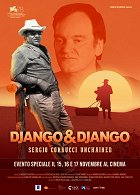Suoratoistopalvelut (1)
Juonikuvaukset(1)
According to the exceptional storyteller Quentin Tarantino, Sergio Corbucci was “the second best director of Italian westerns,” as a character declares in his recent movie Once Upon a Time in Hollywood and as was confirmed by his choice to base Django Unchained on a film made by Corbucci in the 1960s. Previously unseen material from the time, testimonies and reconstructions used to present a unique period in cinema. Django, Il grande silenzio, Gli specialisti, Il mercenario, Vamos a matar compañeros, Cosa c’entriamo noi con la rivoluzione: Corbucci’s westerns as cinema of cruelty, but also as great inventiveness and as metaphor for all the ideas that were circulating in the Italy of the 1960s. With testimonies from Franco Nero (Corbucci’s favorite actor) and Ruggero Deodato (assistant director on Django), with unreleased Super8 films made on the sets of the Roman director’s movies and with images from the years in which Italian cinema was able to speak to the whole world. And with animations that reconstruct a climate, a spirit, a way of living and conceiving cinema. (Venice International Film Festival)
(lisää)Arvostelut (1)
An infectiously enthusiastic fan documentary about "the other Sergio" who poured ketchup all over his western spaghetti. I was surprised and pleased that Quentin Tarantino has a starring role, because it wouldn't be nearly the same without him. In the opening credits, Tarantino retells a cut scene from Once Upon a Time in Hollywood in which Corbucci recruits Rick Dalton, and in the closing credits he retells his own version of Django's story, both with an amazing twist. But these stories are no exhibition by Tarantino, he’s not promoting himself or his films, but paying homage to Corbucci. Franco Nero and Ruggero Deodato do the same thing, but with flashbacks. Directorially, the documentary is very brisk, varied (divided into Tarantino-esque chapters, of course) and entertaining. The fact that it focuses almost exclusively on Corbucci's westerns doesn't matter at all, of course.
()
